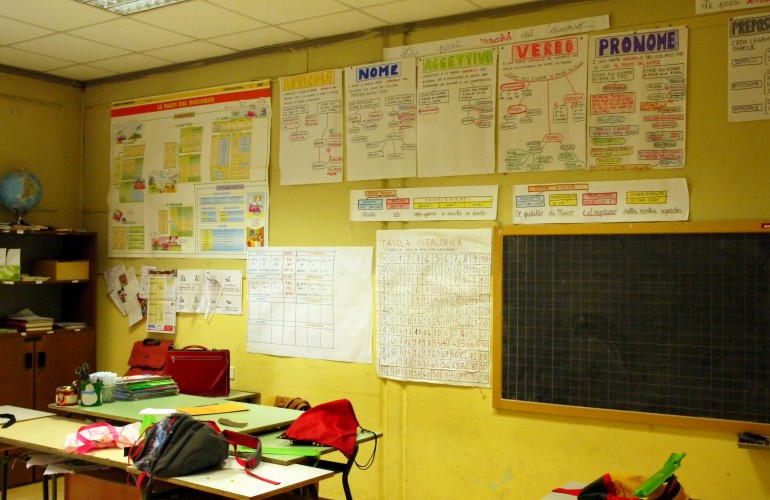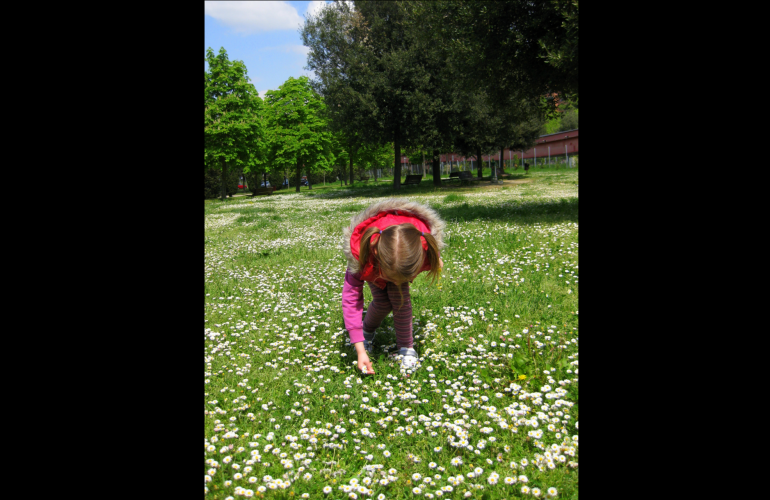Elementary schools are set up a little differently here in Italy than they are in the U.S. For one thing, kids here typically go to school six days a week but only in the mornings. This allows families to eat the main meal of the day together, and then children spend the afternoon doing homework, going to extracurricular activities, and living it up at the neighborhood playgrounds. There are some schools with a five-days-a-week, eight-hours-a-day setup to accommodate working parents, but most families still choose mornings-only and enlist grandparents to babysit in the afternoons if need be. (We don’t have the grandparent option, but since Dan and I both started working from home, family life has become about 2,089,573,101 times less complicated. And all God’s entrepreneurs said amen.)
Another significant difference here is that teachers are assigned to a class in first grade and then stay with that group of kids all the way through fifth grade. This can be wonderful and reassuring if you get good teachers.
…And if you don’t?
I devoted significant energy to worrying over this four years ago when Natalie was about to start first grade and again last year when it was Sophie’s turn. What if the girls ended up with someone calloused and grim, someone to whom children’s presence tasted like unripe lemons? Someone drunk on power or palest green with inexperience or prejudiced against foreigners like us? What if their teachers were the kind to tread on sensitive, creative little hearts? What if my girls had to spend five long years’ worth of school days in a classroom taut with tension and defeat?
I was reminded of these fears last Saturday morning at the girls’ school recital, but not for the reason you might think. Sophie’s first-grade class started off with a little skit about how they had once been afraid they’d get witches for teachers, and I laughed along with the other parents while reflecting that my own fears for my daughter hadn’t been so very different. I had gone into my girls’ school experience geared up to fear and resent their teachers, imagining the worst of them before we’d even met.
This was a sobering realization as I looked around the room on Saturday and saw the faces of the women who have guided and encouraged and invested in my girls over the school year(s), women who were every bit as proud of my children’s academic progress as I was. I kept sneaking peeks at the teachers during the girls’ performances, and the affection radiating from their faces was enough to untie a knot somewhere in my throat. Fear was a distant (and regretful) memory. All I had left was gratitude, so full-bodied and sweet it blurred my vision.
Gratitude for those who have made education their lives’ work.
Gratitude for the creativity and fun they bring to the classroom despite budget cuts and bureaucratic hurdle-fests.
Gratitude for the unique imprints they have left on my daughters through their insights, personalities, and talents.
Gratitude for their presence in my girls’ lives, every teacher a support column to their childhoods.
I once believed that “It takes a village” was liberal propaganda designed to undermine the family structure, and I’m sure that residual fallout from that belief helps explain why I was so afraid of the girls’ teachers sight-unseen. As I’ve experienced in so many aspects of my journey away from fundamentalism, though, fears lose their claustrophobic grip once I’m out in the spacious, grace-full open. I’m not saying that bad teachers don’t exist or that we haven’t been fortunate so far, but my mindset is coming from a different direction now—one of preemptive appreciation rather than preemptive dread. And as Saturday morning solidified for me, I am above and beyond grateful for this little village in which my girls get to grow.







